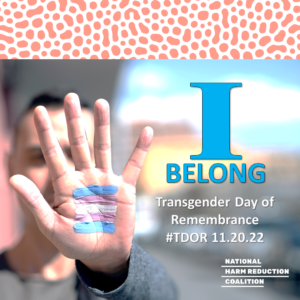 We are heartbroken by the horrific shooting at Club Q that left five people dead and 25 injured – and a countless number of people forever changed by this violence – a mass shooting that happened as Transgender Awareness Week came to a close, on the eve of Trangender Day of Remembrance. Each of the people who were killed were loved deeply. They had dreams, talents, unique personalities and laughter, and love and light to share with the world. Club Q should have been a safe place for them – free from homophobia, transphobia, and the violence this hate represents and further causes. These victims should have been able to enjoy a night of dancing, catching up with friends and making new ones, and, simply put, having fun. They deserved to live full, happy lives, to grow old, and to live in peace.
We are heartbroken by the horrific shooting at Club Q that left five people dead and 25 injured – and a countless number of people forever changed by this violence – a mass shooting that happened as Transgender Awareness Week came to a close, on the eve of Trangender Day of Remembrance. Each of the people who were killed were loved deeply. They had dreams, talents, unique personalities and laughter, and love and light to share with the world. Club Q should have been a safe place for them – free from homophobia, transphobia, and the violence this hate represents and further causes. These victims should have been able to enjoy a night of dancing, catching up with friends and making new ones, and, simply put, having fun. They deserved to live full, happy lives, to grow old, and to live in peace.
As we mourn the victims whose lives were cut short by this violence, National Harm Reduction Coalition (NHRC) stands in solidarity with all those impacted – the survivors, their families, the victims’ loved ones, and the greater LGBTQIA+ community. It is evident how much more we must do collectively to safeguard and support the lives of the queer community, which has been attacked in so many ways – from physical violence and harmful legislation to exclusion and the implementation of barriers to basic human needs, including gender-affirming health care.
NHRC and the harm reduction movement would not be what it is today without the LGBTQIA+ trailblazers who laid the foundation and paved the way for social justice. This framework, built on love as resistance, stands firmly today because of the queer community. Today and every day, we must double down on our commitment to working with and for people who use drugs and communities impacted by drug use, many of whom are Black, Indigenous, People of Color (BIPOC) members of the LGBTQIA+ community – and pay homage to our origins, lifting up those who made a way out of no way.
Taylor Edelmann, NHRC’s LGBTQIA+ Health and Harm Reduction Manager, said, “We’d like to remind folks that harm reduction was a movement created by queer folks, Black and Brown folks, and Indigenous folks to survive and respond to their needs. This was done out of stark necessity because systems and institutions were never designed in a way that encouraged their survival. Instead, they were, and are still, set up for failure.”
“It might be hard for some to see the connection, but the tragedy at Club Q in Colorado Springs this weekend is precisely why we embarked on a half-year series highlighting TGNCNB (Transgender and gender Non-Conforming Non-Binary) voices in our harm reduction community. As a way to add depth and vibrancy to our movement. To show that our community, like any other community, is not a monolith but one that will continue to endure despite tragedy after tragedy. We have been the targets of incessant violence and vitriol. Still, despite it all, we will continue to fight for our rights to be recognized as the magnificent, brilliant human beings we are – and we encourage others to stand in solidarity with us so that we may call on a more hopeful future,” he said.
To learn more about NHRC’s Lighthouse Learning Collective, including the series mentioned above and how to support or get involved in this work, visit https://harmreduction.org/our-work/action/lighthouse-learning-collective/ .
To donate on behalf of the Club Q shooting victims, the state-run organization Colorado Healing Fund has organized a fundraiser, shared directly by Club Q.
About NHRC: National Harm Reduction Coalition (NHRC) is a nationwide advocate and ally for people who use drugs, creating spaces for dialogue and action that help heal the harms caused by racialized drug policies. As a national advocacy and capacity-building organization, NHRC promotes the health and dignity of individuals and communities impacted by drug use. From coast to coast, our efforts advance harm reduction policies, practices, and programs that address the adverse effects of drug use including overdose, HIV, hepatitis C, addiction, and incarceration. Learn more. Follow us on Facebook, Instagram, or Twitter.
